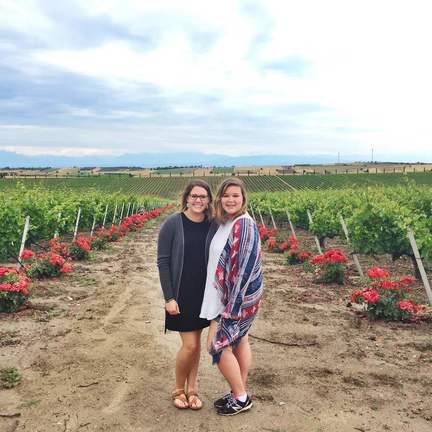
In this changing world, sustainability as it relates to agriculture and food has become a major topic of interest. In 2016, Karlee Pruitt, a graduate of Agricultural Education, Communications and Technology, participated in the Food, Agriculture and Sustainability program in Greece. The program was a faculty-led tour that highlighted food, agriculture and sustainability in Greece.
The students on this trip were able to experience Greek culture, food and lifestyle each day.
“We visited the island of Crete where we explored the island and learned about the people and agriculture practices at the college, Maich,” said Pruitt. “Then we spent nine days in Thessaloniki at the American Farm School. There we learned from faculty members about food, agriculture and sustainable practices in Greece. We were also able to learn the history of Greece and the city from locals. Our last four days was spent visiting monasteries and Athens.”
While in country Pruitt realized that asking questions and having an open mind are important for academic development.
“While in Greece I learned of a method Greek growers use to detect diseases before it would infect the crop. I saw rose bushes placed at the ends of grape vines. The roses can build a mildew signaling the presence of a fungal disease before it reaches the grapes,” said Pruitt. “I asked my academic advisor about this method and she explained to me that method of detection was proven inaccurate years ago by researchers in the U.S. This contributed to my academic development by highlighting how much there is for me to learn. I realized that I needed to make sure to ask questions and be open to both new and old ideas/technologies.”
Pruitt did not only grow academically during this adventure, she also experienced personal growth.
“Growing up in a young country, I always believed that we as human beings were meant to grow, change and innovate. We were supposed to advance ourselves and the world. Other older countries, like Greece, do not believe that. The people are filled with tradition and ancestry. I had never truly experienced a culture that was so deeply rooted. I grew personally by understanding that history is not just a thing of the past, it contributes to many people’s lives to this day. It made me realize to stop and take a minute to gaze upon what was in front of me than to speed through the day rushing to accomplish every single task in front of me,” said Pruitt.
After this experience, Pruitt reflected on the goals she has set for her future career. She was inspired by this experience to expand those goals.
“I now understand how important horticulture will become now that land and resources deplete rapidly. Greece does not have the landscape suitable for many crops or large animal operations. The landscape in Greece is rocky with mountains and hills everywhere. The people may have less than an acre of land to work with and the country is in a state of financial depression,” said Pruitt. “My career goal is to teach and learn about how a society and people can survive by utilizing the small amount of land and resources available. My career path is strong in regards to what I wish to accomplish in the field of horticulture as long as I can convince others that it is the best option.”
Pruitt was greatly impacted by this adventure and she encourages others to take the journey as well.
“Studying abroad is like taking on an epic challenge,” said Pruitt. “While on your adventure you will learn so much, more than you expected and things you had never thought of. It’s worth every penny.”



